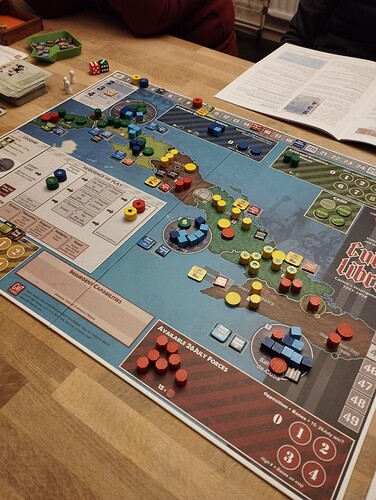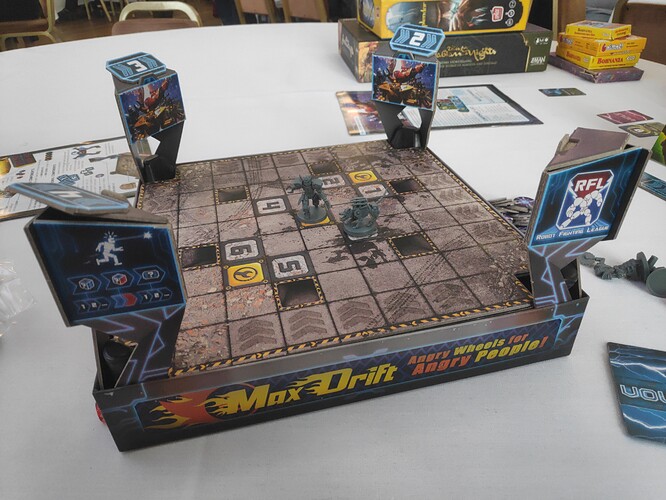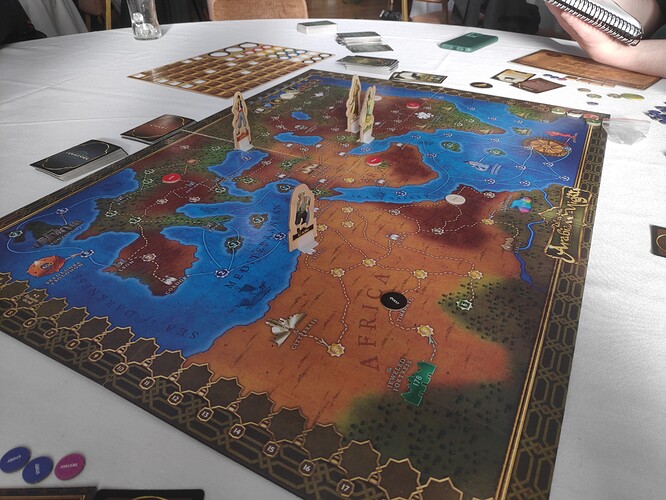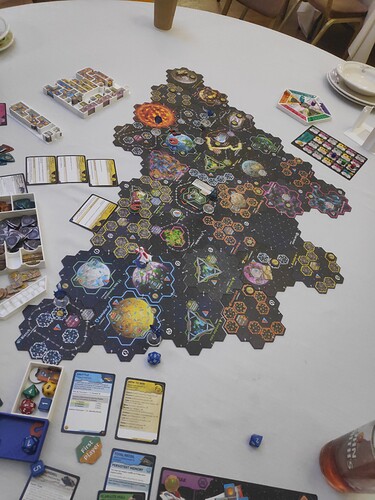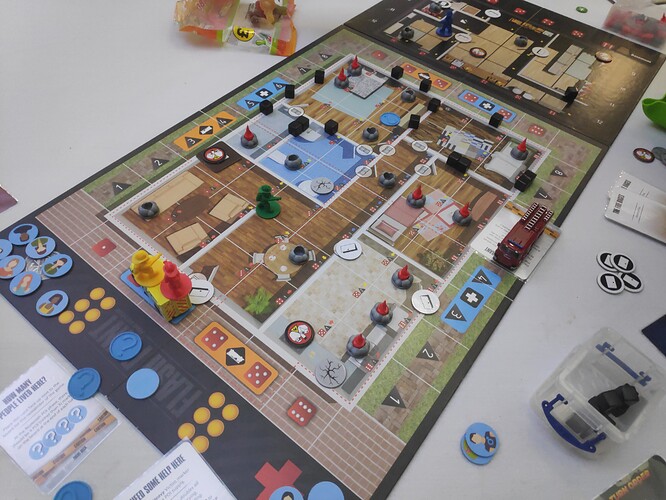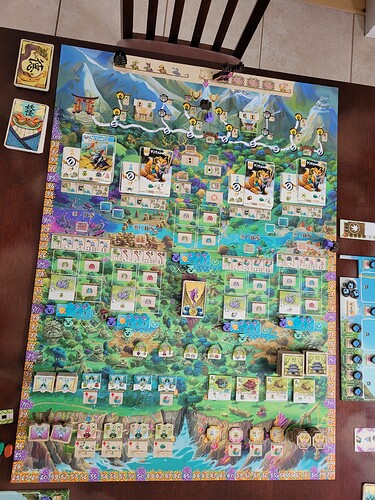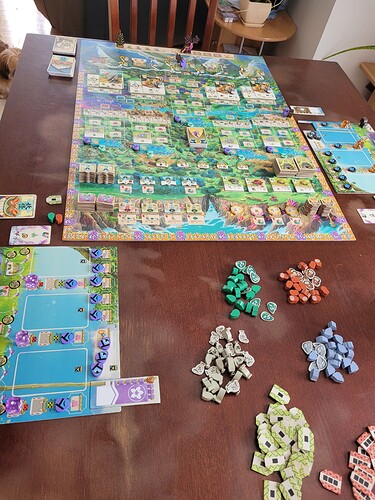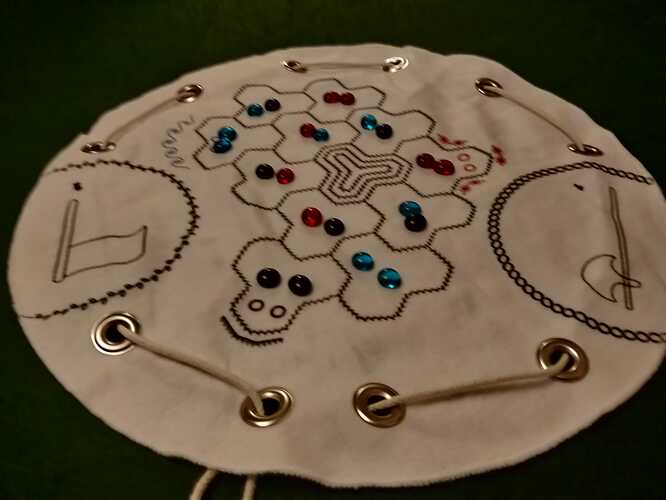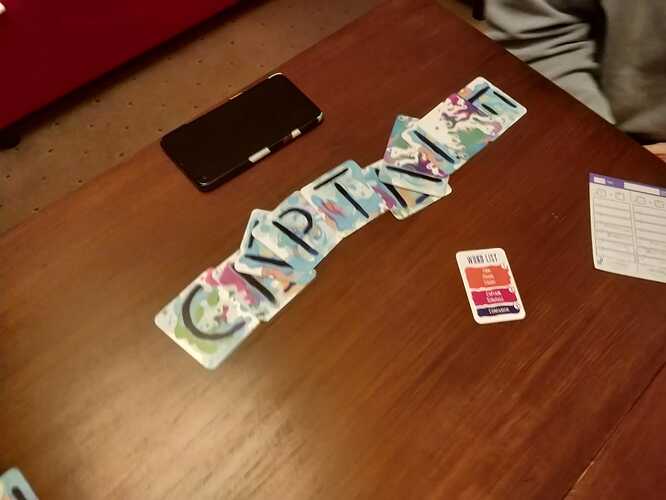One of the problems I’ve observed about Tetrarchia in comparison to most Pandemicy games is that there’s no strict timer on the game. Those other games often have multiple timers in play (card decks, numbers of outbreaks) besides token supply, and furthermore are balanced such that the timers will likely make for a tense finish regardless of the result; whereas Tetrarchia has only the token supply (with the game ending if too much of the empire is in revolt) and so it’s possible to be “treading water” indefinitely, with the situation neither improving nor worsening sufficiently for an actual outcome.
(There’s a second failure condition if the barbarians enter Rome, but that’s a different category of end-game condition.)
So anyhow, I just finished my longest ever game of this, clocking in at (I think… I didn’t take note of the exact start time) around 2.5 hours. It was Tetrarchia at both its best and its worst… It was epic; but also a grind. (The difficulty settings were my usual 4-1-2-2 config, in case anyone wonders.)
The dice were not my friends for the first hour. Due to the rampant barbarian activity and constant uprisings I’d secured maybe 2/6 borders in that time, and I couldn’t seem to catch a break. If I had only one existing revolt in a region, you can bet that’s the location I’d be rolling to trigger another uprising. If I needed the barbarians to cross difficult terrain to attack me, you can bet they wouldn’t (usually meaning I needed to leave multiple forces in place rather than attend to problems elsewhere). It was a slog, and while I was managing to win the battles at strategic locations, I was slowly losing the war for control.
Things got very bad, and for the next hour continuously I figured I was “about to lose”. I managed to clear and secure another border, but huge portions of the empire were now in revolt, and I was just barely keeping my head above water, only managing to suppress sufficient of the existing revolts to provide the tokens I needed in order to place the new revolts which were continually cropping up, while still managing to manoeuvre and coordinate against the barbarians when necessary. I think I had a maximum of 3-4 tokens in supply at any point for that whole duration, whilst almost always having 2-3 barbarian armies on the move, and with numerous opportunities for an unfortunate uprising to require me to place more tokens than I had available. These were some very slow turns (but I’m playing solo, so it’s ok :) as I planned multiple moves ahead to ensure everyone would be where they needed to be to support one another at the right time, while still suppressing as many revolts as possible.
And then, finally, the dice seemed to turn in my favour. The barbarians gave me some respite; the uprisings ceased for a while; and I began to claw back some territory. The situation was still pretty dire, but for the first time since the start of the game I felt like I had some momentum. In fairness a lot of rolls had been going my way even during the, er, diciest periods of the game; but I really needed something significant to happen in order to turn it around.
That turning point came as two barbarian armies were moving west along the African coast with a third coming out of Asia in the east. Blue and yellow were preparing for the latter, while red was positioned in Africa as a support role. Red was too weak to attack the incoming armies itself, but I still needed its support as I did not have enough actions to cut the barbarian supply lines. Ultimately I needed this battle to take place against green (who had garrisons to the north to bolster its strength) and with the support of red from the west – which I could only gain by moving green into Sicilia. However Sicilia was in revolt, and green didn’t have enough actions left after travelling there to fully suppress that; all I could do was reduce the revolt to “unrest”, and leave the outcome in the lap of the gods. What the gods were pondering here was (1) a 50/50 call as to whether the unrest sprang back to revolt (which would immediately send green into retreat); (2) a second 50/50 call as to whether the barbarians would actually attack; and (3) on that 25% chance of the battle even taking place, I still needed a favourable roll of the battle dice in order to win. I won! Yellow and red acted next, with red repositioning itself for the second army, and then came my strongest turn in the whole game: blue began its actions by defeating the barbarians in the north (with support from yellow) and then immediately sailed to Africa, landing at the rear of the remaining barbarian army and cutting its entire supply line! The severely-weakened barbarians attacked red (who had the flanking blue emperor in support) and were defeated.
Reducing the three armies to zero in a handful of turns like that finally gave me the breathing room that I needed to make some real inroads into the revolts, and regain some control before any further armies could make an appearance.
There was another heavy swing against me yet to come, which again saw my supply of tokens in a perilous state, but it proved to be the final storm to be weathered. In the preceding calm I’d secured a 4th border; the odds shifted in my favour; the dice refrained from the cruel outcomes they had plagued me with early in the game; and the barbarians kept away from the unsecured borders for long enough that I started to see light at the end of the tunnel.
I still had a lot of clean-up to do, but my emperors were able to make relatively quick work of that once the distractions had reduced to a minimum, and I was able to shut down most new cases of unrest and revolt before they became bigger problems.
It was certainly a rollercoaster, but it’s also just not a game that you want to last that amount of time. If that duration was commonplace, it would be awful. It was a memorable game (and would have made for a pretty good timelapse video), but I hope I don’t play its like again anytime soon.
